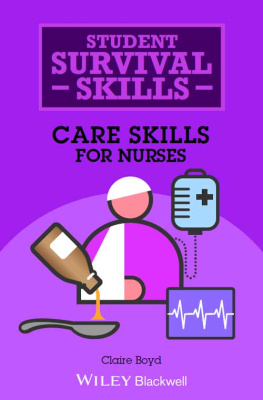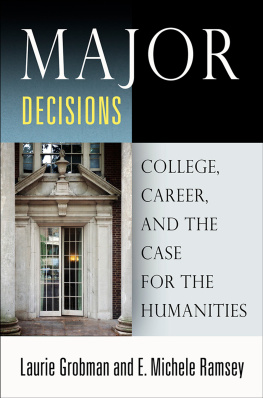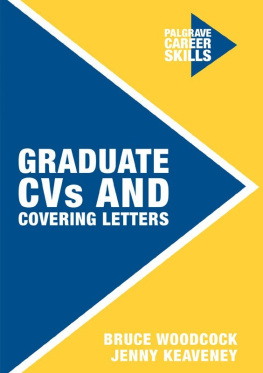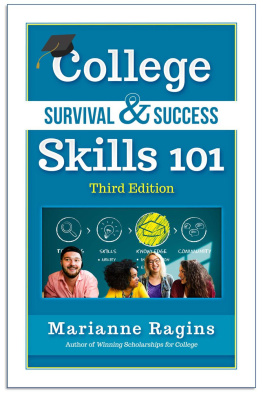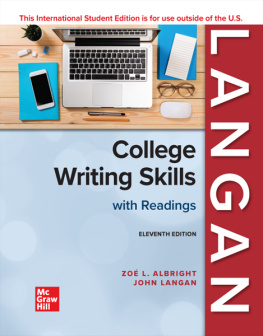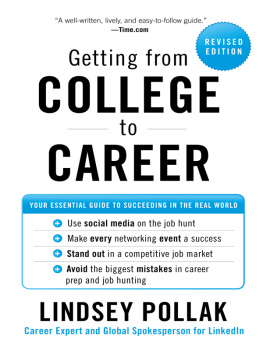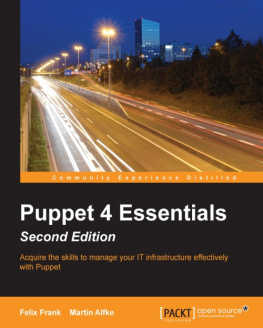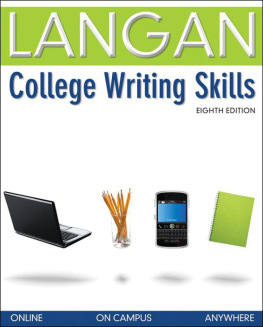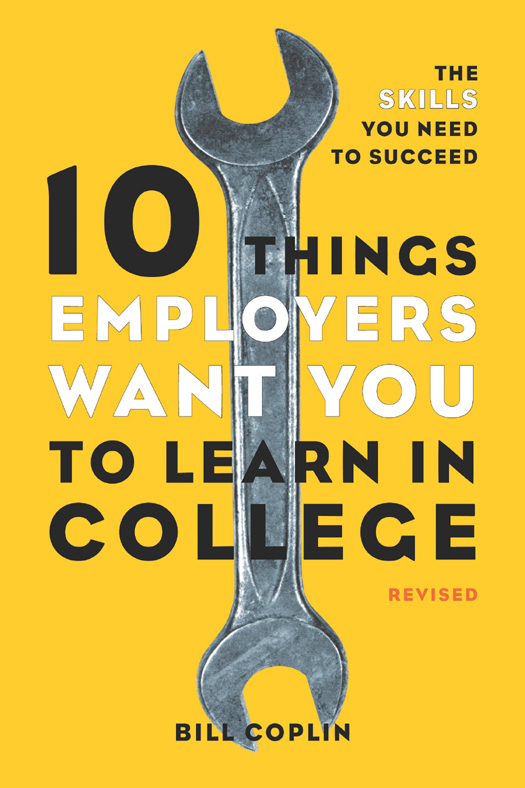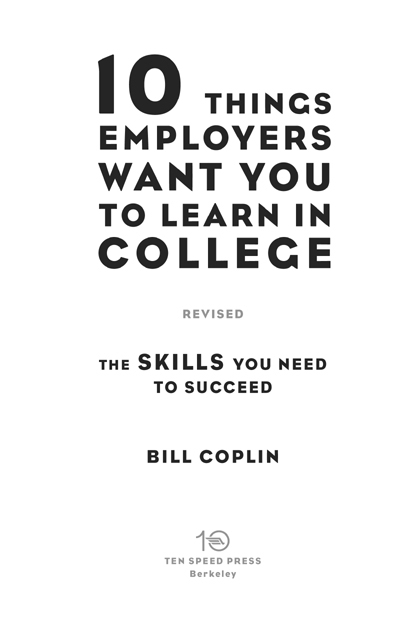Copyright 2003, 2012 by Bill Coplin
All rights reserved.
Published in the United States by Ten Speed Press, an imprint of the Crown Publishing Group, a division of Random House, Inc., New York.
www.crownpublishing.com
www.tenspeed.com
Ten Speed Press and the Ten Speed Press colophon are registered trademarks of Random House, Inc.
A previous edition was published in the United States by Ten Speed Press, Berkeley, in 2003.
Library of Congress Cataloging-in-Publication Data
Coplin, William D.
10 things employers want you to learn in college, revised : the skills you need to succeed / Bill Coplin.
p. cm.
Summary: A straightforward guide that teaches students how to acquire marketable job skills and real-world know-how before they graduateProvided by publisher.
1. Career educationUnited States. 2. College student orientationUnited States. 3. Career developmentUnited States. I. Title. II. Title: Ten things employers want you to learn in college.
LC1037.5.C68 2012
370.113dc23
2012004869
eISBN: 978-0-307-76849-0
Design by Chloe Rawlins, based on the previous editions design by Ed Anderson, SKOUT
v3.1
To the memory of
MICHAEL K. OLEARY
for his support as a friend and colleague
This book benefited from the help of many students, alumni, and staff of Syracuse University and colleagues around the country who responded to the first edition. Hundreds of students have used the book and provided me with useful feedback for this new edition.
I would like to single out a few students who went beyond the expected. For the first edition, Gina De Rosa worked almost full time on it during the summer of 2002 and, despite her heavy schedule, contributed many hours during the fall semester as my primary research assistant on the book. For this revised edition, Lauren Ottaviano conducted research, solicited reviews, enlisted help from other students, and provided writing and editorial assistance. She played a major role in bringing the perspective of a current undergraduate and in keeping the whole process organized. Others who helped with this edition are Mary Beth Anagnost, Kelly Baug, Sean Heron, Zach Lax, Jeffrey Van Liew, and Elizabeth Zarecki.
Several alumni helped out their old professor by providing reactions and, in several cases, text that I quoted. They include Gwyneth Blevins, Sharon Ehm, Rebecca Holmes, Sarah Korf, Matt Marsh, John Mandyck, Lisa Mueller, and Gary Puddles.
Special thanks to Mike Pasqualoni, who supported me in training my students to use the library and its electronic services and who gave me excellent advice for . Chris Walsh, dean of financial aid, provided information on student debt. Special thanks to Tim Conway, a career and college coach as well as a college instructor, who has been a constant source of information and encouragement over the past few years and provided reactions and information used in this book.
I want to thank Grace Freedson, my agent, who hooked me up with Ten Speed, the best possible publisher; Brie Mazurek (first edition) and Emily Timberlake (revised edition), my editors at Ten Speed, who worked with me on the development of the final manuscript and came up with many bright ideas; and Jean Blomquist, who did a wonderful job copyediting.
Finally, thanks to my wife, Vicki, who shares with me the value of education for a purpose. She provided inspiration for this book, kept me on task for details, and encouraged me to complete the manuscript.
All of these people were helpful, but I take full responsibility for what you are about to read.
Bill Coplin
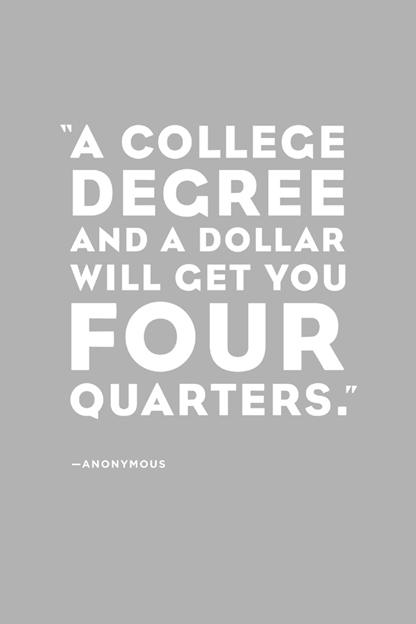
If you are in college or intend to go to college, the single most irritating question that your family and others may ask you is this: What are you going to do with your college degree? This book will provide the answer: Im not just getting a degree. Im developing the skills to succeed in whatever career I pursue, and when I finish my degree, Ill be able to prove that to my future employerand you, too! If you master the skills presented in this book, you can make this statement confidently because you know you will accomplish much more in college than simply completing courses and getting a degree.
Both good news and bad news face all college students, which is why this annoying question is asked so often. In the face of unlimited opportunity (the good news) and a high degree of risk (the bad news), everyone gets anxious. Heres a quick overview of the good and the bad news.
THE GOOD NEWS
Over their work life, college graduates earn an average of $2.1 million dollars compared with $1.2 million dollars for high school graduates.
Someone with a professional degree (MD, JD, or MBA, for example) will earn $4.4 million.
College graduates live longer, seem to be happier, vote more often, and are less likely to be unemployed or on welfare than nongraduates.
You and your parents and family will be proud.
THE BAD NEWS
College tuition is likely to continue to increase at both private and public schools.
Sixty-three percent of students who begin a four-year college do not finish in four years, and 42 percent do not finish in six years.
Two-thirds of college seniors who graduated in 2010 had student loan
In 2010, 85 percent of college seniors planned to move back home according to Time magazine.
The number of jobs not requiring a bachelor of arts will increase.
Research shows that the majority of college graduates do not improve key skills while in college.
The bad news has gotten much worse since I wrote the first edition of this book in 2002. The demand for students with college degrees in the humanities and social sciences has gone down.
College may be a day on the beach for some who live in the now, but it does not automatically lead to a beautiful life. Going to college is a risky business and getting more risky by the day. Like any investment requiring a lot of up-front money, four years of college can have a very big downside. Even if you get a good job, you may have huge debts to pay off. Paying off those debts may take a long time. If that doesnt scare you, think about this possibility: you drop out after two years and are saddled with $25,000 in debt. Thats definitely bad news.
This book gives you the tools to avoid becoming one of those bad news statistics. It will help you avoid those risks and disappointments and take advantage of the big payoffs that a college education can provide. Aside from luck and other uncontrollable factorssuch as the state of the economy at the time you graduate or some kind of family crisisthe key to a successful career is what you can



